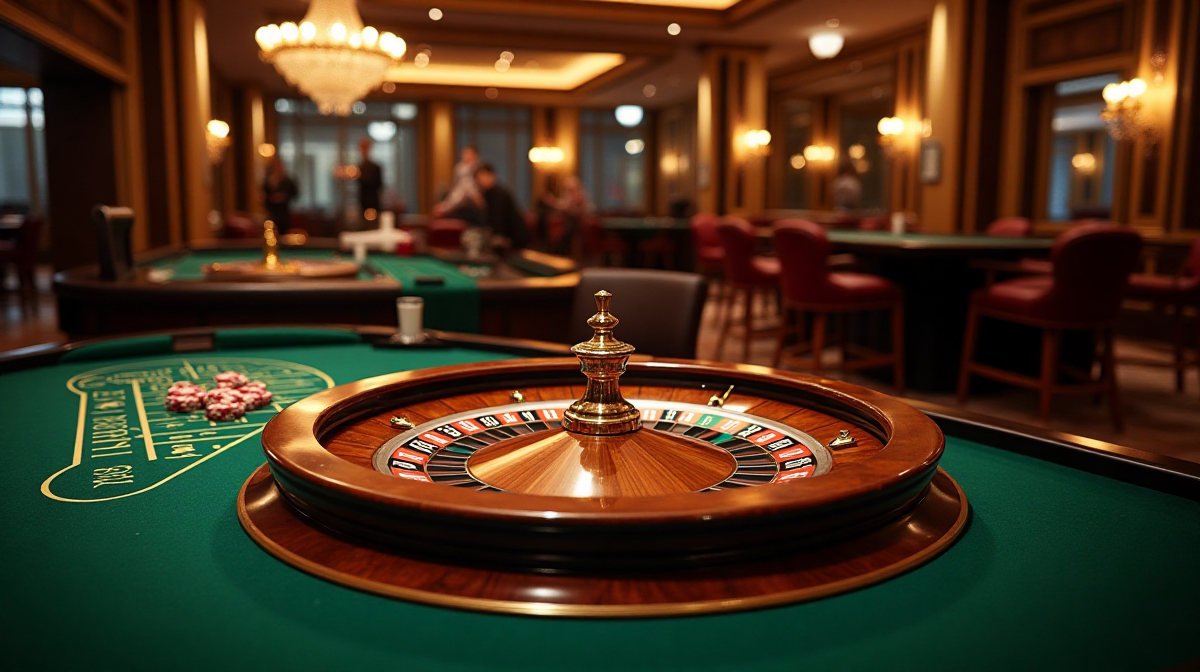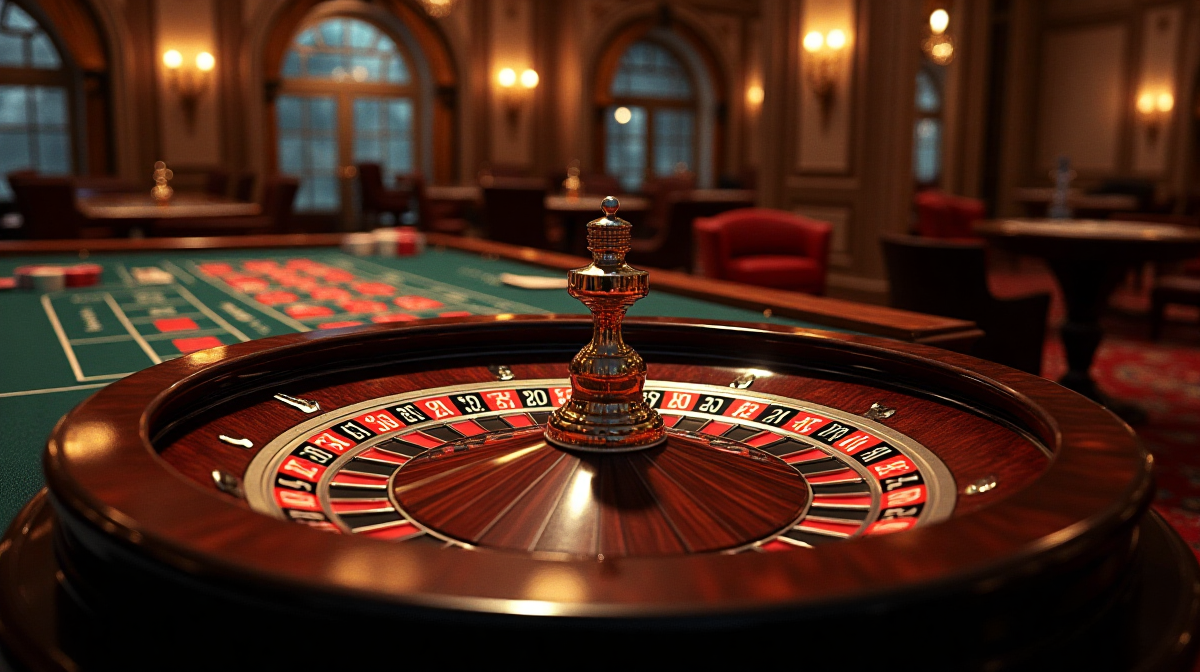Roulette Game: 5 Tips to Beat the Odds
The Allure of Roulette: A Brief History & Why People Play
Roulette, a game steeped in history and glamour, has captivated players for centuries. Originating in France in the 18th century, likely evolving from earlier games like 'Hoca,' it quickly spread across Europe and eventually to the Americas. Its simple premise – predicting where a ball will land on a spinning wheel – belies a complex game of chance with a devoted following. The thrill of anticipation, the elegance of the casino atmosphere, and the potential for significant winnings all contribute to its enduring appeal. Many players are also interested in platforms like r2bet to find the best betting odds and opportunities.
Debunking the Myth: Can You Really Beat Roulette? – Setting Realistic Expectations
Let's be clear: roulette is ultimately a game of chance. There's no guaranteed system to win consistently. The house edge, inherent in the rules of the game, mathematically favors the casino. However, understanding the probabilities, employing smart strategies, and practicing responsible gambling can significantly improve your experience and potentially increase your winning chances over time. Sites offering r2bet predictions can offer insights, but remember these are still predictions, not guarantees.
Overview of the 5 Tips We’ll Cover
This article dives into five key tips to help you navigate the world of roulette with a more informed and strategic approach: Bankroll Management, Mastering Outside Bets, The Martingale System, Utilizing a Betting Progression, and Recognizing Wheel Bias. We’ll explore each concept in detail, providing practical advice to elevate your gameplay and understand the risks involved. Knowing if a r2bet draw is coming up could potentially influence your strategy, though caution is key.
Understanding Roulette Fundamentals
Dissecting the Roulette Wheel: European vs. American & House Edge
The roulette wheel comes in two primary variations: European and American. The European wheel has 37 slots (numbers 1-36, plus a single zero), while the American wheel has 38 slots (numbers 1-36, plus a zero and a double zero). This seemingly small difference dramatically impacts the house edge. The European wheel boasts a lower house edge of 2.7%, compared to the American wheel’s 5.26%. This means, statistically, you'll lose less money over time playing European roulette.
Types of Bets: Inside, Outside, & Announced Bets – Explained
Roulette offers a wide variety of bet types. Inside bets are placed on specific numbers or small groups of numbers (e.g., straight up, split, street, corner). These offer higher payouts but have lower probabilities of winning. Outside bets are placed on broader categories (e.g., red/black, odd/even, high/low), offering lower payouts but higher probabilities. Announced bets (often found in land-based casinos) are verbal declarations of a bet layout. Understanding these options is crucial for tailoring your strategy.
Probability Basics: Understanding Your Chances of Winning
Every bet on the roulette table has a corresponding probability of winning. For example, a straight-up bet on a single number has a 1/37 (European) or 1/38 (American) chance of hitting. Outside bets like red/black have nearly 50/50 odds (slightly less due to the zero(s)). Grasping these probabilities informs your bet sizing and expectations. Many seeking an edge look at platforms like r2bet for data-driven insights.
Tip #1: Bankroll Management – The Foundation of Responsible Play
Setting a Budget: Determine Your Loss Limit Before You Start
Before you even place your first bet, define a bankroll – the amount of money you're willing to risk. Crucially, determine your loss limit. This is the maximum amount you’re comfortable losing without impacting your financial well-being. Once you reach this limit, stop playing, regardless of whether you're winning or losing.
Bet Sizing Strategy: The Importance of Consistent Wagers
Avoid drastically increasing or decreasing your bet size based on recent outcomes. A consistent bet sizing strategy, such as wagering a small percentage of your bankroll on each bet (e.g., 1-5%), helps to prolong your playing time and weather losing streaks.
Avoiding the Gambler's Fallacy & Chasing Losses
The gambler's fallacy is the mistaken belief that past events influence future independent events. Just because red has come up ten times in a row doesn’t mean black is “due.” Each spin is independent. Similarly, avoid chasing losses – trying to win back what you've lost by placing larger and riskier bets. This often leads to even greater losses.

Tip #2: Mastering Outside Bets – Lower Risk, Higher Consistency
The Power of Red/Black, Odd/Even, High/Low Bets
Outside bets offer a more conservative approach to roulette. Bets like red/black, odd/even, and high/low have close to 50/50 odds, providing a greater chance of winning consistently, albeit with smaller payouts. These are a good starting point for beginners.
Column and Dozen Bets: Expanding Your Coverage
Column and dozen bets cover roughly a third of the roulette wheel. They offer payout odds of 2:1, striking a balance between risk and reward. While the probability of winning is lower than red/black, the payouts are higher.
Understanding the Payouts & Probabilities of Each Outside Bet
Familiarize yourself with the payouts and probabilities of all outside bets. This knowledge empowers you to make informed decisions based on your risk tolerance and desired Return to Player (RTP). You may find discussions on r2bet concerning these statistical breakdowns.
Tip #3: The Martingale System – A Controversial Strategy
How the Martingale System Works: Doubling Your Bet After Every Loss
The Martingale system is a progressive betting strategy that involves doubling your bet after every loss. The idea is that when you eventually win, you’ll recoup all previous losses plus a small profit.
Risks and Limitations: Bankroll Requirements & Table Limits
The Martingale system is notoriously risky. It requires a massive bankroll to withstand potentially long losing streaks. Furthermore, most casinos have table limits, which can prevent you from doubling your bet indefinitely.
Is Martingale Sustainable? A Realistic Assessment
The Martingale system is not sustainable in the long run. While it may work in the short term, the odds are stacked against you. A long losing streak, coupled with table limits, will inevitably lead to bankruptcy.
Tip #4: Utilizing a Betting Progression – Beyond Martingale
The D’Alembert System: A More Conservative Approach
The D’Alembert system is a less aggressive progression strategy. After a loss, you increase your bet by one unit. After a win, you decrease it by one unit. It requires a smaller bankroll than the Martingale system but offers slower recovery.
The Fibonacci Sequence: Applying Math to Your Bets
The Fibonacci sequence (1, 1, 2, 3, 5, 8, 13…) can also be used as a betting progression. You move along the sequence after each loss, increasing your bet according to the next number. After a win, you move back two numbers in the sequence.
Comparing Progression Systems: Which One Suits Your Style?
Different progression systems suit different playing styles. The Martingale is high-risk, high-reward. The D’Alembert and Fibonacci systems are more conservative. Consider your risk tolerance and bankroll before choosing a progression system. Resources discussing strategies, and even potentially r2bet predictions, may help inform your choice.
Tip #5: Recognizing Wheel Bias & Observed Patterns (Advanced)
What is Wheel Bias & Why It’s Difficult to Detect
Wheel bias refers to the tendency of a roulette wheel to favor certain numbers or sections due to imperfections in its construction. However, modern roulette wheels are meticulously engineered to minimize bias.
The Importance of Observation & Tracking Results (Carefully!)
In land-based casinos, carefully observing and tracking results over a long period of time might reveal subtle biases. However, this requires a significant investment of time and effort, and the results are often inconclusive. Remember, no way out: the roulette is a common sentiment, emphasizing the game's inherent randomness.
Online Roulette vs. Land-Based Casinos: Bias Possibilities
Online roulette uses Random Number Generators (RNGs) to determine the outcome of each spin, removing the possibility of physical wheel bias.

Responsible Gambling & Conclusion
The Importance of Setting Time Limits and Taking Breaks
Roulette can be addictive. Set time limits for your playing sessions and take frequent breaks to avoid impulsive betting and maintain a clear head.
Recognizing Problem Gambling: Resources & Support
If you feel your gambling is becoming a problem, seek help. Numerous resources are available, including the National Council on Problem Gambling and Gamblers Anonymous.
Final Thoughts: Roulette is a Game of Chance, Play Wisely.
Ultimately, roulette is a game of chance. While these tips can improve your understanding and strategy, there’s no foolproof way to guarantee winnings. Always gamble responsibly, stick to your budget, and remember that the primary goal should be entertainment. Consider the information available through platforms like r2bet, but rely on informed decision-making and disciplined gameplay for the best experience – especially when exploring the roulette game.

